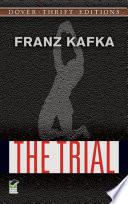Quotes from book
The Trial

The Trial is a novel written by Franz Kafka between 1914 and 1915 and published posthumously in 1925. One of his best-known works, it tells the story of Josef K., a man arrested and prosecuted by a remote, inaccessible authority, with the nature of his crime revealed neither to him nor to the reader. Heavily influenced by Dostoyevsky's Crime and Punishment and The Brothers Karamazov, Kafka even went so far as to call Dostoyevsky a blood relative. Like Kafka's other novels, The Trial was never completed, although it does include a chapter which appears to bring the story to an intentionally abrupt ending.

“…it is not necessary to accept everything as true, one must only accept it as necessary.”
'A melancholy conclusion,' said K. 'It turns lying into a universal principle.In the Cathedral
Source: The Trial (1920), Chapter 9

“It's only because of their stupidity that they're able to be so sure of themselves.”
Variant: It is only because of their stupidity that they are able to be so sure of themselves.
Source: The Trial

he said, it was as if the shame of it should outlive him.
Source: The Trial (1920), Ch. 10, end of the book

“Beyond a certain point there is no return. This point has to be reached.”
5; variant translations:
From a certain point onward there is no longer any turning back. That is the point that must be reached.
As quoted in The Unfinished Country: A Book of American Symbols (1959) by Max Lerner, p. 452; also in Wait Without Idols (1964) by Gabriel Vahanian, p, 216; in Joyce, Decadence, and Emancipation (1995) by Vivian Heller, 39; in "The Sheltering Sky" (1949) by Paul Bowles, p. 213; and in the poem "Father and Son" by Delmore Schwartz.
There is a point of no return. This point has to be reached.
The Zürau Aphorisms (1917 - 1918)
Variant: From a certain point onward there is no longer any turning back. That is the point that must be reached.
Source: The Trial

Variant: No," said the priest, "you don't need to accept everything as true, you only have to accept it as necessary." "Depressing view," said K. "The lie made into the rule of the world.
Source: The Trial (1920), Chapter 9

First lines, Ch. 1
Variant translation: Somebody must have slandered Joseph K., for without having done anything wrong he was arrested one fine morning.
Source: The Trial (1920)
Context: Someone must have been telling lies about Joseph K., for without having done anything wrong he was arrested one fine morning. His landlady's cook, who always brought him his breakfast at eight o'clock, failed to appear on this occasion. That had never happened before.

“Logic may indeed be unshakeable, but it cannot withstand a man who is determined to live.”
Source: The Trial (1920), Ch. 10
Context: Logic may indeed be unshakeable, but it cannot withstand a man who is determined to live. Where was the judge he had never seen? Where was the High Court he had never reached? He raised his hands and spread out all his fingers. But the hands of one of the men closed round his throat, just as the other drove the knife deep into his heart and turned it twice.

“"Like a dog!" he said, it was as if the shame of it should outlive him.”
Source: The Trial (1920), Ch. 10, end of the book

“Even that has its reason; it is often better to be in chains than to be free.”
Source: The Trial (1920), Ch. 8

Josef K. in Ch. 2
Variant translation: Your question, Mr. Examining Magistrate, as to whether I am a house-painter — although you did not ask a question at all, you made a statement — typifies exactly the kind of proceedings that are being instituted against me.
The Trial (1920)

“What an obstacle had suddenly arisen to block K.'s career!”
Source: The Trial (1920), Ch. 7
Context: What an obstacle had suddenly arisen to block K.'s career! And this was the moment when he was supposed to work for the bank? He looked down at his desk. This the time to interview clients and negotiate with them? While his case was unfolding itself, while up in the attics the Court officials were poring over the charge papers, was he to devote his attention to the affairs of the bank? It looked like a kind of torture sanctioned by the Court, arising from his case and concomitant with it.